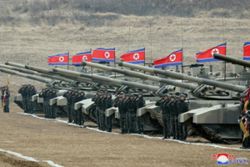PETALING JAYA: The lack of spare capacity could put Westports Holdings Bhd at a slight disadvantage amid the sporadic global port congestion.
at a slight disadvantage amid the sporadic global port congestion.
As it is, Westports had already seen a loss of market share to two major Straits of Malacca ports, namely, Port of Singapore (PSA) and Port of Tanjung Pelepas (PTP), in the first quarter of 2024 (1Q24), UOB Kay Hian (UOBKH) Research said.
Uh-oh! Daily quota reached.







































